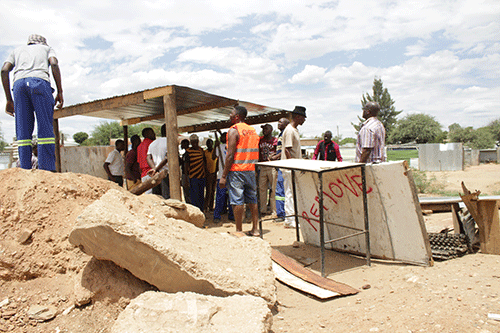Government is not defending the apartheid regime by opposing activist Dimbulukeni Nauyoma’s constitutionality challenge of the squatters proclamation law.
This is the view of lawyers roped in to defend government and the attorney general in the ongoing case.
“We want to make it clear that the first and second respondents (government and attorney general) are not here to defend apartheid. They are here to defend the principle of legality and rule of law,” said government attorney Dennis Khama. He said the proclamation serves a legitimate governmental objective of protecting property rights and prohibiting unnecessary land invasions which could have a serious impact on the country’s economy.
“The fact that this law was enacted during apartheid and as much as apartheid was bad, the rule of law still stands,” said Khama. He added that basing the constitutionality challenge on the fact that the law was enacted during apartheid has no basis as the constitution makes provision for such laws and that they shall remain in force until repealed or amended by Act of Parliament or until they are declared unconstitutional by a competent court.
Khama made the submissions yesterday in the Windhoek High Court before a full bench of judges.
He explained it is necessary for a democratic state such as Namibia to ensure that property rights are protected and the proclamation ensures that unlawful land invasions that violate the interests and rights of landowners are prohibited.
According to Khama, if any unlawful entry to any land is not regulated by law or if there is a vacuum in the law in so far as the protection of the rights of landowners is concerned, it may create social conflicts between landowners and those that occupied the land illegally.
Nauyoma’s lawyer Kadhila Amoomo said the main purpose of the enactment of the Squatters Proclamation law by the apartheid government was to ensure that natives did not have access to land and housing in urban areas.
He said the same law still does not reflect the reality of the Namibian people. He labelled it broad and vague. “If the provisions to avail housing to the masses are not catching up with urbanisation then criminalisation cannot be against the people who cannot make ends meet,” said Amoomo.
He said land and housing are basic human needs.
Thus, the erection of structures and occupation of land for purposes of housing as a basic need should not be criminalised as it is currently done by the Squatters Proclamation Act.
According to Amoomo, Namibia should follow in South Africa’s footsteps and do away with such a law.
“South Africa came up with alternatives (Squatters Rights) to accommodate their citizens who are facing eviction or who cannot afford housing unlike in Namibia and we believe that Namibia must do the same and declare the Act unconstitutional,” said Amoomo. Nauyoma is seeking a court order declaring the Squatters Proclamation AG, 21 of 1985, unconstitutional and for it to be repealed.
The particular Act, amongst many things, provides for the removal of persons unlawfully occupying land or buildings, and for the demolition of structures that are unlawfully erected.
In court documents, Nauyoma is arguing the Act does not make provisions for circumstances under which unlawful land occupiers obtained the land.
Furthermore, it does not consider the period the person may have occupied the land from which eviction is being sought. The activist also highlighted the Act does not make provision for special consideration of the rights of the elderly, children, disabled persons, and homes that are headed by women – and it further does not give provision for an alternative dispute solution surrounding the unlawful occupation of land. Before instituting the legal challenge, Nauyoma was arrested in January 2019 for allegedly attempting to stop Windhoek City Police officers from demolishing a shack belonging to Okuryangava resident and a single mother of two, Wilhemina Shipingana.
He has been charged with counts of unlawfully entering the land, without having authority to, and without lawful cause. He is further charged with obstructing officers of the law from carrying out their duties. Judges Colins Parker, Boas Usiku, and George Coleman will give judgement in the matter on 15 February 2023.
-mamakali@nepc.com.na


